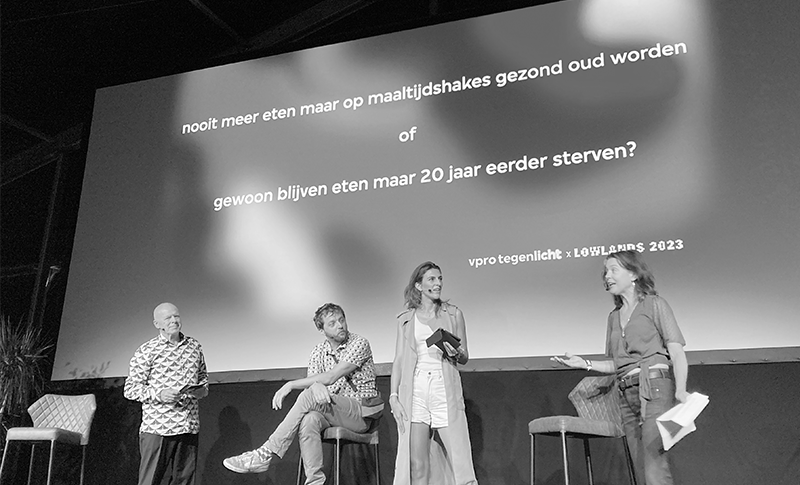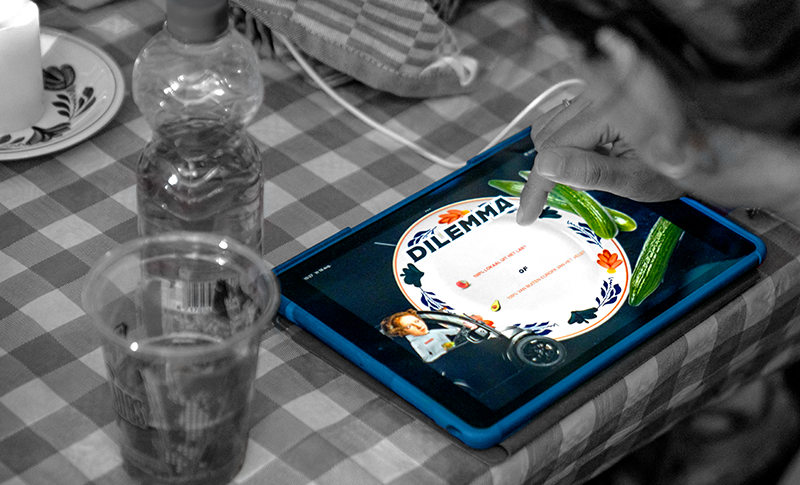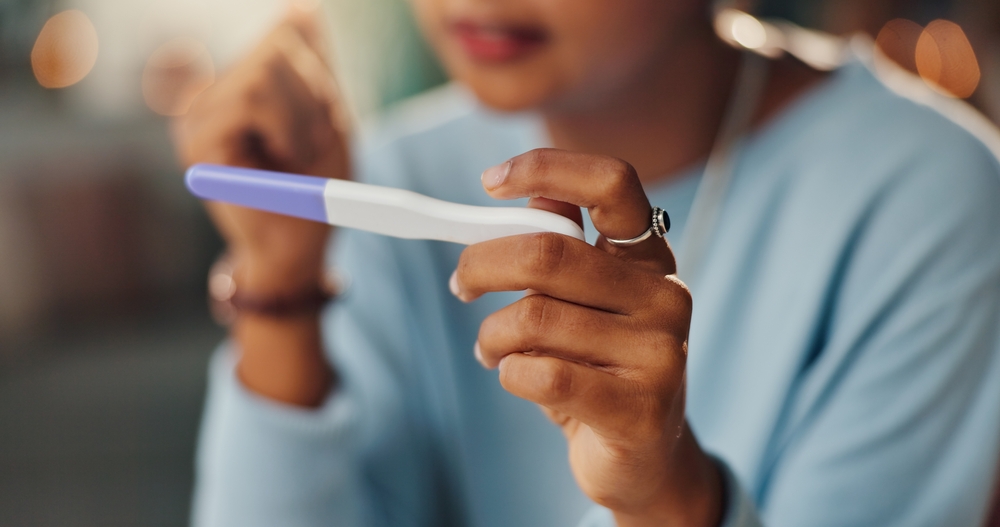In the front row of the Echo – the culture and science tent at Lowlands music festival – WUR researcher Sigrid Wertheim-Heck is swinging away to the rousing music coming from the speakers. It is Saturday, the second day of the music festival, and the tent is slowly filling up. In a few minutes, Wertheim-Heck gets to go on stage for a panel discussion about ‘the menu of tomorrow’ for the TV programme VPRO Tegenlicht.
‘Before we try to make our food production more sustainable, there are other questions we should think about,’ says Wertheim-Heck, consumption sociologist and associate professor of Global Sustainable Food Systems, during the panel discussion. ‘What and how will we eat in future? And do we eat to nourish ourselves or for the sake of the activity of eating itself? What do we see as normal? Take Lowlands, for example: it started as a music festival, and slowly but surely it has turned into a massive food festival. It seems we consider that normal.’
Digital plates
Elsewhere in the Lowlands Science area, Wertheim-Heck has set up a tasting restaurant, right next to the Alpha tent, Lowlands’ main podium where the biggest names are performing all weekend. The restaurant, designed to suggest the seabed – a reference to the festival grounds on reclaimed land in the Flevo polder – has seven tables seating four people each. The tables are laid with red-and-white checked tablecloths. There are baskets of bread and tablets showing digital Dutch crockery on which dilemmas are served. In this restaurant setting, she hopes to find out how Lowlanders perceive the Dutch food system. ‘We’d like to know what they think about our society, in which we consume a lot, and about how we can make the food system healthier, fairer and more environmentally friendly,’ Wertheim-Heck explains. ‘For example, how important is it to them to eat together with other people? How important do they find it that other people have enough to eat? And what if we could afford to give everyone access to healthy, sustainable food if we paid for our consultations with our GPs? We confront the participants in the experiment with tricky dilemmas, to which there isn’t a single ideal answer.’
I wouldn’t want to miss a single pizza
The experiment has proven popular. ‘Since the start of the festival, every session has sold out. Maybe that’s because you can have lunch here without eating,’ says Wertheim-Heck enigmatically. When the VPRO presenter gives her a quizzical look, she laughs: ‘You do get food! The only question is: what do you see as food?’
Shakes or death?
Lowland-goers can take part in the experiment for the rest of Saturday and Sunday. During the panel discussion, the researcher is reluctant to give away much about the dilemmas they’ll be faced with so as not to influence their thinking. But she does talk about a couple of them – and the preliminary results. Would you rather take potluck in a neighbourhood restaurant and that everyone has enough food, or eat whatever you fancy at home, while there isn’t enough food for everyone? The presenter asks everyone to stand up if they would choose the first option and remain seated if they would go for the second. Nearly everyone stands up. The researcher says that matches the answers of the people who took part in the experiment on Friday: about 70 per cent opted for the neighbourhood restaurant.

The next dilemma causes more of a stir, judging by the noise from the audience. ‘Would you rather never eat solid food again but reach a ripe old age in good health living on meal replacement shakes, or carry on eating normally but die 20 years earlier?’ Wertheim-Heck reports that according to the first results, 62 per cent of the Lowland participants would rather die younger than deny themselves solid food. One man in the front row agrees whole-heartedly: ‘I wouldn’t want to miss a single pizza.’ His mate agrees with him: he really enjoys his food, whereas the man in the next seat would opt for healthy ageing on meal replacement shakes. ‘To me, life is too good to choose to die 20 years earlier.’ The woman next to him nods vigorously: ‘It sounds lovely to me, living on shakes.’
Wertheim-Heck’s enthusiasm prompts her to share a third dilemma with the audience. ‘We ask the guests whether they would rather never have a shower but keep access to fresh fruit, or never have access to fresh fruit but be able to take a shower. Lowlanders overwhelmingly choose fruit over showers, according to Friday’s results.’ The popularity of fruit among the festival-goers was also clear from the disappearance of the fruit hanging on the wall. Wertheim-Heck: ‘Halfway through the day, we noticed that the banana which was hung up as art had been nicked.’
Animations
After the panel discussion, Wertheim-Heck heads back to her restaurant. ‘We collaborated on this experiment with a filmmaker and an animator. We serve our guests five courses in the form of plates displaying animations about our current food system, with suggestions on how it could be different. What we’re doing really is giving the participants some food for thought. In between, visitors are presented with dilemmas, which could be seen as appetizers.’
How important is it to us for everyone to have enough to eat?
The animations are made from film clips that once went viral, such as Marijke Helwegen’s ode to the cucumber and a Rotterdam man throwing a pan of noodles out of the window. As they watch the clips, the restaurant goers are silent and all eyes are on the screen. But as soon as the dilemmas come into view, there is a buzz of conversation. People are keen to know how others voted.
Individualism
Three women in their twenties leave the restaurant afterwards. ‘I found it a fascinating experiment, with videos describing very recognizable situations. That makes you think,’ says one. ‘Our society is strongly geared to capitalism and individualism,’ adds another. ‘This is reflected in the experiment, for example, in the bit about Uber Eats delivery people. There should be a bit less of that. And less consumption.’ When asked if they would like to live exclusively on shakes, their answer is loud and clear: ‘no.’ The third woman says: ‘I’m willing to change, but the alternative has to be a bit palatable!’
After Lowlands, Wertheim-Heck is enthusiastic about her experiment and the preliminary results. ‘The experiment was 100 per cent fully booked from the first to the last session. We have been invited to conduct the experiment at other venues as well, and we are working on a plan for Dutch Design Week, in Eindhoven later this year.’
Free lunch
Sigrid Wertheim-Heck’s Lowlands Science experiment FREE-LUNCH-FREE is part of the NWA project ‘Transition to a sustainable Food System’, funded by the Dutch Research Council. It was carried out in collaboration with SugarRushFilm, with animations by Kristiaan Funke.
VPRO Tegenlicht’s Lowlands programme on the menu of tomorrow can be watched here.

 The research participants were served dilemmas on tablets showing digital Dutch crockery. Photo Max Peters | Goldfish
The research participants were served dilemmas on tablets showing digital Dutch crockery. Photo Max Peters | Goldfish 

